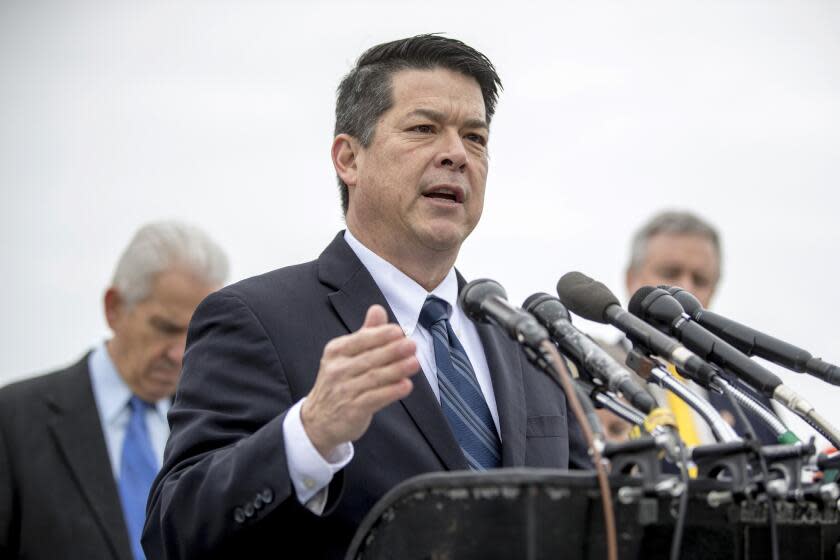Ex-congressman from Fresno expected to take plea deal in federal fraud case

T.J. Cox, a former Democratic congressman from Fresno, is finalizing a plea deal in a sweeping federal case in which he is accused of campaign contribution fraud and stealing from his own companies, his attorney said Friday.
Cox, 60, previously pleaded not guilty to 15 counts of wire fraud, 11 counts of money laundering, one count of financial institution fraud, and one count of campaign contribution fraud.
On May 15, Cox's attorney, Mark Coleman, filed papers in U.S. District Court seeking to schedule a change-of-plea hearing for July.
"We expect to reach an agreement in the relatively near future," Coleman told the Times.
He did not provide details about the agreement but said Cox "is taking this very seriously."
A spokeswoman for the U.S. attorney's office declined to comment on a potential deal because an agreement had not yet been filed.
"Things can change," she said.
In August 2022, Cox, a one-term member of the U.S. House of Representatives, was arrested by FBI agents and briefly jailed after the federal government unsealed an indictment accusing him of swindling at least $1.7 million from business partners and multiple companies that he owned.
Some of the money allegedly was used as illegal straw donations to his 2018 congressional campaign. In that race, Cox narrowly defeated three-term Rep. David Valadao, a Hanford Republican, and flipped the Central Valley's purpling 22nd Congressional District from GOP control.
Cox unseated Valadao by just 862 votes amid the so-called anti-Trump "blue wave" when Democrats took control of the House.
In 2020, Cox lost by 1,522 votes in a rematch against Valadao, who later became one of 10 House Republicans to vote for former President Trump's impeachment after the Jan. 6 insurrection.
Cox is expected to have a change-of-plea hearing in federal court on July 29.
After his 2022, arrest, Cox emerged from the Fresno County Jail and told reporters that he was innocent and a victim of political persecution.
“Politics is a tough game,” Cox said. “I wouldn’t be in this position today but for the politics, and I think we all know that.”
Cox's alleged crimes, according to the federal complaint, involved three businesses: an almond-processing company that he partially owned; a sports nonprofit, for which he was a co-director, that operated an ice skating and hockey rink in Fresno; and a Fresno-based business he partially owned that helped other companies get loans and federal tax credits for development in disadvantaged areas.
Cox defrauded the tax credit company and its clients of more than $1 million, prosecutors allege.
The indictment accuses Cox of opening an unauthorized bank account using the company's name "without the knowledge of the other owners" or its accountants, tax preparers or auditors.
He allegedly diverted checks and wire transfers intended for the company and used the money to pay for personal expenses, to fund other business ventures and to pay off personal and business debts.
Cox is accused of causing losses of $750,000 to lenders and investors in the almond company. He allegedly diverted funds using another unauthorized bank account opened without knowledge of his business partners or the company's accountants.
Prosecutors say that in April 2017, Cox fraudulently solicited a $100,000 loan said to be for almond processing equipment, deposited it into a personal bank account, and did not pay it back.
Some of that money allegedly was used for private school tuition, credit card and mortgage payments, and a $7,000 payment to Cox's political consultant.
The indictment also alleges that Cox lied to secure significant loan funds.
As a business partner in a Fresno sports nonprofit that applied for a $1.5-million construction loan to develop land in the city’s Granite Park, he fabricated a board resolution that stated his tax credit company would guarantee the loan, prosecutors said.
The loan was approved, but the sports nonprofit eventually defaulted, and the tax credit company bought the debt after Cox had left the company.
During his 2018 run for Congress, prosecutors said, Cox took money from the fraudulent almond company account and from the sports nonprofit and gave it to business associates and family members who donated to his campaign under their names.
If convicted, Cox faces a maximum statutory penalty of 20 years in prison and a $250,000 fine for wire fraud and money laundering, 30 years in prison and a $1-million fine for wire fraud affecting a financial institution, and five years in prison and a $250,000 fine for campaign contribution fraud.
This story originally appeared in Los Angeles Times.


